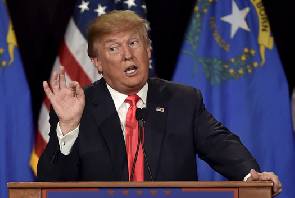President Donald Trump wants to pass an immigration reform bill that could grant legal status to millions of undocumented immigrants living in the US.
“The time is right for an immigration bill as long as there is compromise on both sides,” Trump told reporters Tuesday at the White House.
The President is eager to pass a compromise immigration bill in his first term that would stop short of granting a path to citizenship for millions of undocumented immigrants, but would allow undocumented immigrants who aren’t serious or violent criminals to live, work and pay taxes in the US without fear of deportation, a senior administration official said.
Trump included the idea of a compromise in his address to a Joint Session of Congress on Tuesday night.
“I believe that real and positive immigration reform is possible, as long as we focus on the following goals: to improve jobs and wages for Americans, to strengthen our nation’s security and to restore respect for our laws,” Trump told lawmakers. “If we are guided by the well-being of American citizens then I believe Republicans and Democrats can work together to achieve an outcome that has eluded our country for decades.”
But Trump also signaled he stands behind some of his most controversial pledges from the campaign cycle, including the “extreme vetting” behind his travel ban that was blocked by the courts, and a call to cut back on low-skilled workers entering the country with a “merit-based” immigration system.
A path to citizenship for those in the country illegally would not be part of Trump’s vision for this deal, with the possible exception of “Dreamers” — those brought into the US illegally as children.
News of the President’s support for a comprehensive reform of the US’s immigration system fell against a backdrop of increasingly aggressive actions by immigration authorities across the US, who under Trump’s administration have found new freedom to deport undocumented immigrants who have not been convicted of a serious crime — the bar they were told to abide by under President Barack Obama’s tenure.
But Trump’s new apparent desire to grant legal status to many undocumented immigrants living in the US also marks a startling reversal from the positions he championed during his campaign for president. Trump focused on the need to build a wall along the US-Mexico border, and for much of his campaign, called for deporting all estimated 11 million undocumented immigrants living in the US. The closest he came to calling for a path to legalization for undocumented immigrants was in his calls to allow the “good ones” who had been deported to reenter the US through an expedited, legal process.
Democrats on the Hill may be open to working with the administration on a compromise, sources said — but healthy skepticism remained about Trump’s true intentions on Tuesday and lawmakers signaled they’d want to see more from the President, and less aggressive immigration enforcement actions, before they believed him.
Tackling immigration reform would be another massive legislative endeavor, piling on top of Trump’s already ambitious goals of repealing and replacing Obamacare and passing a tax reform package.
It would perhaps be the ultimate test of Trump’s deal-making credentials, which he touted daily on the campaign trail.
Supporting a pathway to legalization for millions of undocumented immigrants could roil his base of supporters, many of whom flocked to Trump early on due to his controversial and hardline position on immigration.
But the official said Trump does not see the bill as something that would necessarily upset Trump’s base, stressing that there would need to be “a softening on both sides.”
“It has to be a negotiation,” the official said, arguing that the bill theoretically could make people on both the “far right” and “far left” happy — and it’s a negotiation the President believes he could successfully broker, the official said.
The President believes that the nation is now in a position where it can pass immigration legislation after decades of failed efforts, and he believes the country is “exhausted.”
“There’s got to be a coming together,” the official said.
In private, immigration activists on both sides of the spectrum believe that compromises can be made during Trump’s tenure, although the inclusion of a “pathway to citizenship” for the millions of people living in the US illegally remains a tough sticking point.
“People would be willing to discuss it,” one senior Democratic Hill aide who works on immigration issues said.
For Democrats, “there is openness to discussing options that may fall short of a full path to citizenship,” the aide added.
Still, healthy skepticism remains about whether the White House is being genuine.
“It’s just hard to believe this President,” the Democratic staffer said. “He says things in one room to one group of people and then the next day he does things that are the opposite.”
Senate Minority Leader Chuck Schumer said Trump still has work to do to gain Democrats’ trust.
“He’s got a lot to undo,” Schumer said. “The immigrant community is rightfully scared of what President Trump has done. His executive order goes far beyond what anyone proposed. People are cowering. It’s going to hurt us economically. … (The administration doesn’t) seem to know what they are doing. They simply come up with these proposals that sound good and then they can’t implement them.”
Schumer was echoed by fellow Democrat Oregon Sen. Ron Wyden, who said Trump would have some walking back to do.
“I would have to see the details of any proposal,” Wyden said. “Certainly if he is looking at something bipartisan, he’s going to have to walk back some of the statements that he has made time after time after time, which in effect would say that there’d be a lot of focus by immigration authorities like ICE on people who have not committed any serious crimes.”
The Congressional Hispanic Caucus, mainly made up of Democrats, released a statement in response to Trump’s Tuesday remarks, essentially welcoming him to the immigration reform club.
“We’ve been ready,” said Rep. Michelle Lujan Grisham, chairwoman of the caucus.
As always with immigration reform, the devil is in the details. In 2013, the Gang of Eight’s immigration reform bill passed with wide bipartisan support in the Senate only to die in the House, where leadership did not move it forward.
Many of the compromises in that bill still enjoy wide support in Washington, but the pathway to citizenship has remained toxic for the Republican base, which labeled it “amnesty.”
Trump has taken a hardline position on immigration — with charged rhetoric against illegal immigration throughout the campaign.
In the later stages of the campaign and after, he softened slightly, signaling empathy toward Dreamers and saying that deportations for some undocumented immigrants are not necessarily a priority.
White House spokeswoman Sarah Huckabee Sanders said the President has been clear about his openness to conversations about a compromise on immigration, but added the focus at the moment is “border control” and “deporting criminals.”
For both Democrats and Republicans, the sequencing matters greatly in negotiating a compromise on immigration.
Some Republican lawmakers endorsed the idea of reform compromises, but said they would like to see efforts to move forward come in pieces. Colorado Republican Sen. Cory Gardner said there are areas of “common ground,” but that it would have to be done piecemeal.
“I think that’s something I’ve been asking for for a very long time,” Gardner said. “I think we can find there is a way forward on an immigration package that Democrats and Republican can support. … (But) the American people have expressed whether it’s through the Affordable Care Act or through the Gang of Eight bill that they would rather see a series of package of bills that Congress can use to gain the trust of the American people as we implement the reform.”
Florida Republican Sen. Marco Rubio, one of the members of the 2013 Gang of Eight who suffered politically for his participation, said that he thinks legalization is better than the status quo, though he originally supported a pathway to citizenship in his bill.
“I personally have always believed that it’s not a good idea to have millions of people in your country that can never become citizens but I certainly think legalization is better than what they have now,” Rubio said. “And if that’s what we need to do to get progress, I would be able to accept that.”
But he also said the path forward exists through smaller pieces.
“Immigration reform is something most people are in favor of,” Rubio said.
“It’s what’s in that immigration reform that can quickly become controversial. So we’ll see. It will take a lot of work. It’s a tough issue. And I truly believe it has to be done in multiple steps, piecemeal approach.”
Other Republicans didn’t want to discuss the possibility until border security was addressed.
“It’s an important discussion and one we’ve been trying to resolve for many years now, so I welcome the opportunity to have that discussion,” said No. 2 Senate Republican and Texan John Cornyn. “For my own part, I believe we need to regain the public’s confidence that we’re actually serious about enforcing the law and securing the border, and to me those are the most important priorities.”
Republicans have for years insisted they would be open to immigration reform — if border security and enforcement of existing laws come first. They blamed President Barack Obama for not enforcing laws, and said they did not trust him enough to send him any bill that would be lenient toward undocumented immigrants, alleging he would ignore any enforcement provisions of such a bill.
Now, with Trump as president, the winds have shifted and that argument is off the table, since Trump has made enforcing immigration laws on the books that have been unused for years a priority in his first month as President.
But Democrats are also concerned about sequencing, and while they would agree to certain enhanced enforcement and border-security measures, they are concerned that if they agree to too much compromise, Republicans will never return to working out something to give security to the undocumented immigrants living in the US peacefully who have often have families that are American citizens.
The difficulty has extended even to the narrow BRIDGE Act, proposed by Republican Sen. Lindsey Graham of South Carolina and Illinois Democratic Sen. Dick Durbin, which would give the undocumented Dreamers currently protected by Obama administration policies formal reprieve from deportations, should the policy be ended by the Trump administration.
The legislation enjoys generally wide support among lawmakers and could likely have the votes to pass Congress, but leadership has been hesitant to move the bill forward, with Republicans concerned that it would be viewed by their base as too lenient and Democrats concerned that agreeing to pass the BRIDGE Act along with another compromise would mean other undocumented immigrants would not be given any such relief in the future.








